 Petzlover
Petzlover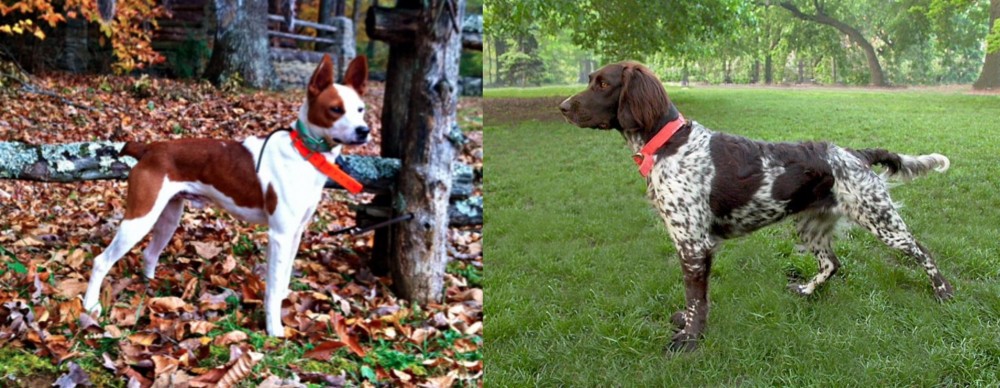 Mountain Feist is originated from United States but Small Munsterlander is originated from Germany. Both Mountain Feist and Small Munsterlander are of same height. Mountain Feist may weigh 28 kg / 62 pounds more than Small Munsterlander. Mountain Feist may live 4 years more than Small Munsterlander. Both Mountain Feist and Small Munsterlander has almost same litter size. Both Mountain Feist and Small Munsterlander requires Low Maintenance.
Mountain Feist is originated from United States but Small Munsterlander is originated from Germany. Both Mountain Feist and Small Munsterlander are of same height. Mountain Feist may weigh 28 kg / 62 pounds more than Small Munsterlander. Mountain Feist may live 4 years more than Small Munsterlander. Both Mountain Feist and Small Munsterlander has almost same litter size. Both Mountain Feist and Small Munsterlander requires Low Maintenance.
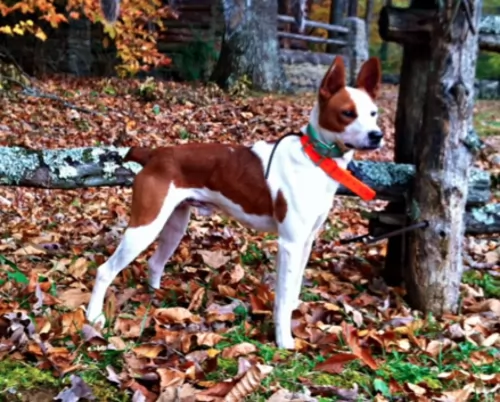 In the Southern portion of North America, the Mountain Feist was developed. It is the Ozarks and Southern Appalachia that the Mountain Fiest calls his ancestral home. The breed dates back centuries and looks very much like a Jack Russell or rat terrier. George Washington, Abraham Lincoln and William Faulkner all featured the breed in their writings. For Washington it was his diary, Lincoln the poem “The Bear Hunt” and Faulkner “Go Down Moses”. These dogs, much like the Curs, were an important part of the early pioneer days in America.
In the Southern portion of North America, the Mountain Feist was developed. It is the Ozarks and Southern Appalachia that the Mountain Fiest calls his ancestral home. The breed dates back centuries and looks very much like a Jack Russell or rat terrier. George Washington, Abraham Lincoln and William Faulkner all featured the breed in their writings. For Washington it was his diary, Lincoln the poem “The Bear Hunt” and Faulkner “Go Down Moses”. These dogs, much like the Curs, were an important part of the early pioneer days in America.
The name Feist means a noisy, small dog in ancient languages. The Feist was developed in the South, the rural areas, in order to hunt and eliminate vermin and small prey animals. The breed was originally a cross between British terriers and hounds from Native Americans. Many others think the feist is not a breed but a type, a working dog which can vary individual to individual.
The Mountain Feist of today has been bred for hunting performance over generations of time. They hunt racoons, squirrel and rabbits among others. They can track even larger game. Other varieties of the feist include the Bench Legged Feist and the Pencil-tail Feist. This is an energetic working dog, curious, intelligent and alert. It is a loud, barky dog that needs to learn a “no bark” command or it may drive you crazy. The breed make good hunting dogs, watch dogs and companions.
The breed was recognized by the United Kennel Club (UKC) in 2015, but not by the AKC or American Kennel Club. Other breed organizations include the National Cur & Feist Breeder’s Association, The National Feist Breeder’s Association, The American Treeing Feist Association, and the Shadowtails Outdoors Group.
 Known also as the Kleiner Munsterlander or just plain Munster, the Small Munsterlander comes from the Munster region of Germany and is a beautiful hunting dog.
Known also as the Kleiner Munsterlander or just plain Munster, the Small Munsterlander comes from the Munster region of Germany and is a beautiful hunting dog.
The dog is recognized by the Fédération Cynologique Internationale as well as other kennel clubs. It is believed that the Small Münsterländer is an ancient breed, more than 500 years old.
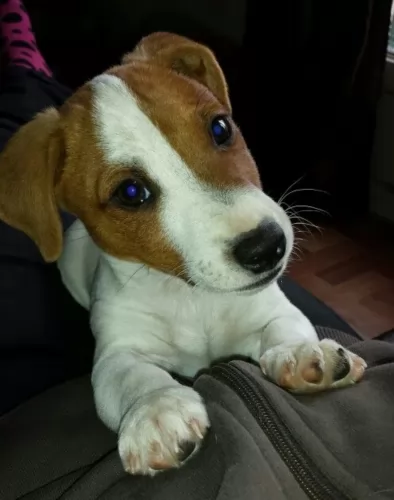 The Mountain Feist is a medium sized dog with pointy ears that are long and fold over. With their sharp nails that are curved they can climb. Their hind legs are strong to support that activity as well. They have small, dark eyes, a black nose and a muzzle that is medium length and a round skull. The neck is strong, and they have a pretty deep chest. The Mountain Feist tail is bushy, high and erect. There coats come in a variety of colors including blue, black, white, red and brown with the brown being the most common.
The Mountain Feist is a medium sized dog with pointy ears that are long and fold over. With their sharp nails that are curved they can climb. Their hind legs are strong to support that activity as well. They have small, dark eyes, a black nose and a muzzle that is medium length and a round skull. The neck is strong, and they have a pretty deep chest. The Mountain Feist tail is bushy, high and erect. There coats come in a variety of colors including blue, black, white, red and brown with the brown being the most common.
There is a lot of variation of make up and type within the breed itself. Until the last decade or so the breed was fairly isolated among squirrel hunters and there was little cross breeding with other dogs. On the other hand, dogs in the regions where the Mountain Feist was isolated were crossed with them to give them the tree climbing ability, change their size, sharpen their senses or one particular sense and change their appearance.
This is why in different regions you will find Mountain Feist with attributes of the Curs, or the Elkhounds, the Terriers, Spitz or Coonhounds. This accounts for the various types of Mountain Feist Dogs.
 Standing at between 52–56cm in height and weighing between 17–26 kg, this dog is thought to be medium sized, muscled and athletic.
Standing at between 52–56cm in height and weighing between 17–26 kg, this dog is thought to be medium sized, muscled and athletic.
Looking like a large Spaniel he also has feathering around the legs and the tail. The coat is medium length and silky and tends to be slightly wavy. The coat is essentially white with large brown patches as well as some ticking.
Small Münsterländers are very intelligent dogs and they won’t have any trouble being trained and socialized. The Small Munsterlander is a natural born hunter and he is in his element when he is outdoors.
For this particular dog, it would be a shame to get a pet like this if you’re a couch potato. It is why this dog is better suited to living in the countryside as opposed to the city. He needs lots of exciting outdoor activities - hikes, walks, ball games, running and he loves swimming.
He is a loving, social dog and just wants to be 100% part of his human family and will adapt well to life with children in the home and with other pets.
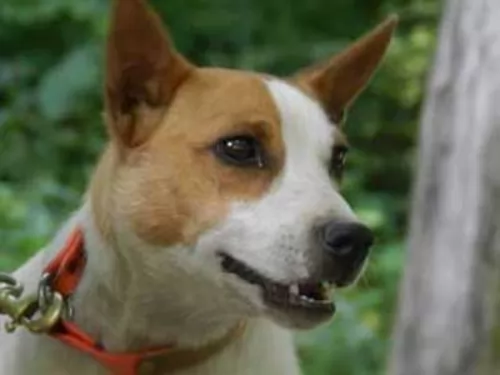 Yes, they very much enjoy playing with children.
Yes, they very much enjoy playing with children.
Tree climbing and stamina.
They need space and land on which to run every day. If you are in an apartment, make sure you have access to a dog park.
They are very intelligent and learn quickly. They love to please but can also be stubborn.
 The Small Munsterlander is such a pretty looking dog with his silky hair. He isn’t only about good looks either and he is intelligent and alert and will learn easily.
The Small Munsterlander is such a pretty looking dog with his silky hair. He isn’t only about good looks either and he is intelligent and alert and will learn easily.
He is a well balanced dog and will make a great pet and companion. He is social, friendly, loving and loyal and makes a great playmate for children.
He has always been a hunting dog and likes to be busy with games and work. Go on a hike and he will love to join you, sniffing along woodland paths and chasing birds. He is in his element when outdoors.
When you bring this beautiful dog into your home, you’re guaranteed to have an ideal pet and companion for the entire family.
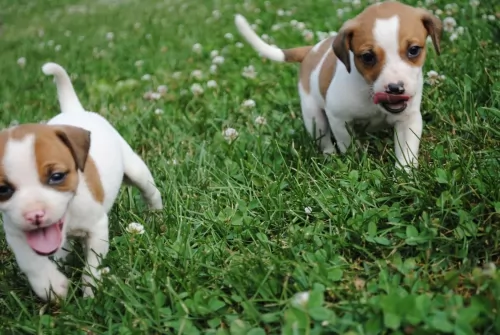 Like most breeds that are isolated, the Mountain Feist does not have a lot of known genetic health issues. They are generally healthy and known to live as many as eighteen years. Perhaps the biggest threat to their lives is the hunting accident, harming joints or paws in hunting situations or being attacked by a larger animal. There are no real genetic threat. Of course, with any dog that has folded ears there is always the possibility of infection or allergies. Keep their ears clean. The other possible concern is hip dysplasia in such an active dog. This can lead to lameness or arthritis. Obesity is another concern that could also lead to hip dysplasia.
Like most breeds that are isolated, the Mountain Feist does not have a lot of known genetic health issues. They are generally healthy and known to live as many as eighteen years. Perhaps the biggest threat to their lives is the hunting accident, harming joints or paws in hunting situations or being attacked by a larger animal. There are no real genetic threat. Of course, with any dog that has folded ears there is always the possibility of infection or allergies. Keep their ears clean. The other possible concern is hip dysplasia in such an active dog. This can lead to lameness or arthritis. Obesity is another concern that could also lead to hip dysplasia.
 There are many clubs and breeders who have a strong commitment to the health of the breed, and this is a healthy, robust dog breed.
There are many clubs and breeders who have a strong commitment to the health of the breed, and this is a healthy, robust dog breed.
The Small Munsterlander can succumb to one of the many common dog illnesses there are. These can be ear infections, dental problems, cancer, diabetes, hip dysplasia, obesity, bloat and many others.
There are so many things that can cause skin problems with your dog, and while it doesn’t sound particularly serious, it can drive your pet crazy as he tries to bite and scratch the itchy parts on his skin.
These nightmarish skin problems are one of the most common reasons pet owners seek veterinary assistance.
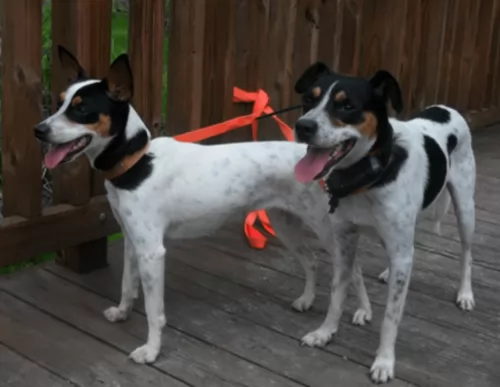 These are very active pups who need a high protein, high quality dry food. Feed a cup to a cup and half broken down into three meals daily. Do not overfeed your puppy.
These are very active pups who need a high protein, high quality dry food. Feed a cup to a cup and half broken down into three meals daily. Do not overfeed your puppy.
Feed the adult about two cups a day broken into two meals. Again, you are looking for a high quality, high protein dry food. Do not overfeed and watch for obesity.
This is a very active breed – a hunting dog with a lot of stamina, strength and energy. They need plenty of exercise as the terrier side of them is just a little hyper. They need at least two walks per day, and they are not great apartment dogs. They need both mental and physical stimulation. This little dog can keep going at a good rate for a long time.
 ⠂ Give your Small Munsterlander the best chance to be healthy and happy by being giving him the best dog food there is.
⠂ Give your Small Munsterlander the best chance to be healthy and happy by being giving him the best dog food there is.
Commercially manufactured dog foods can be a good choice as they’re convenient, and some of the best ones have a good balance of vitamins and minerals in them. Avoid the ones that are packed full of useless ingredients such as toxins and colorants.
Break the monotony of the dry kibble by giving your dog some home-made food. It can be added into the dry kibble about twice a week as a treat. Boiled brown rice and chicken, sweet potatoes, carrots and spinach as well as some pasta can be a nutritious treat. It can be chopped up and added to the dry kibble in small portions.
To avoid skin infections, try to include some raw meat into his diet occasionally.
⠂ Reduce excess hair with shedding by brushing your dog twice a week. Check for fleas and ticks at the same time.
⠂ Just like you, your dog needs a warm, dry, quiet place to sleep undisturbed.
⠂ Keep your garden free of dog poop so that your pet can enjoy a clean place to play and relax. Its hygienic too to pick up his feces regularly.